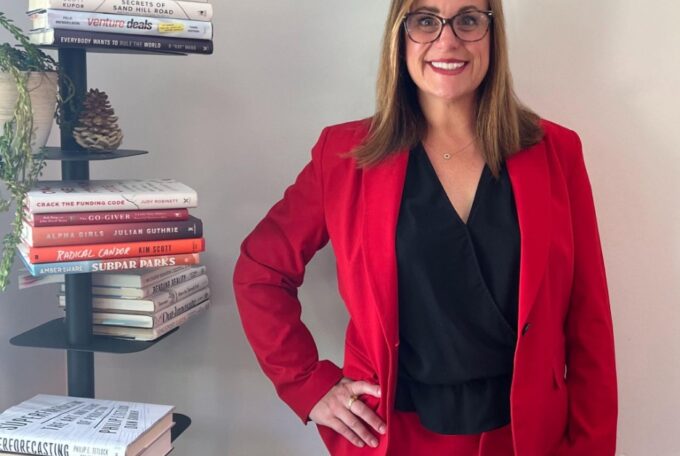Spotlight
Kimmy Paluch
 Kimmy Paluch is the founder and Managing Partner of Beta Boom, an early-stage venture fund that invests in high-growth software companies that are building the future for women and multicultural consumers in the U.S.
Kimmy Paluch is the founder and Managing Partner of Beta Boom, an early-stage venture fund that invests in high-growth software companies that are building the future for women and multicultural consumers in the U.S.
Prior to Beta Boom, Kimmy founded a Silicon Valley innovation firm where she defined the strategic vision and design of award-winning interactive products for startups and high-profile clients including TiVo, LeapFrog and HubSpot. Currently, Kimmy sits on the leadership boards for VentureCapital.org, Utah AA Charitable Foundation, Womenpreneurs and Intermountain Healthcare. She is also part of the leadership circle for The Conservation Lands Foundation.
Kimmy earned her B.A. in Computer Science from Dartmouth College and MBA from MIT Sloan School of Management. She enjoys playing tennis, snowboarding, camping and cheering on her two sons in soccer.
Where do you find investments?
To source the widest deals and reduce bias, we employ an open application process which all investments go through along with a multi-stage process of evaluation. Beyond a large number of inbounds, we receive a large number of referrals from our network of regional organizations, later-stage investors, angels, incubators and other founders with whom we have relationships.
What stage of investments are you looking for?
We invest at the earliest stages of venture – at the pre-seed stage. Our portfolio companies typically have a product in the market and customers or revenue when we invest and are at the early growth stages where they are experimenting on product and marketing channels to improve product-market fit.
What types of investments and sectors are you interested in?
Beta Boom is a for-profit entity, and our equity-based investments are in companies that are predominantly led by diverse founders based outside of Silicon Valley (80% of our portfolio is women- or BIPOC-led and 100% outside of Silicon Valley). We focus on verticals where we expect the greatest growth among the new majority and where the firm’s founding partners bring extensive operational experience: healthtech, fintech, and consumer internet. Beyond being key areas of growth and share of spending power, these industries have also shown strong performance in both exits and seed activity in the emerging tech hubs where we focus.
Do you have any philanthropic endeavors?
Beyond the fund, for the past few years, we have also spearheaded a philanthropic initiative called, New Pattern, which seeks to promote, support and celebrate founders from various backgrounds to change the homogenous narrative of the startup founder. Since 2020, this has included regional coalitions that have come together to provide grants ranging from $5,000 to $20,000 for businesses founded and led by women of color. This started with grants for Black female founders in Utah, a vastly underserved group, and then with the support of Melinda Gates’ GET Cities, expanded to support female founders of color with historical ties to Westside and South Chicago. Beyond capital, this initiative goes further to also provide connections and support from experts, mentors and local organizations that can assist the founders (applicants and grantees alike) to grow, build strategic plans, recruit talent, fundraise, build community and reach their key milestones.
Why do you focus on diverse founders and what criteria do you use to determine where you invest?
Our focus on women and diverse populations is driven by the economic potential as well as by the societal benefits that come from innovations that serve those populations. From an economic standpoint, the data is conclusive. Investing in women and multicultural founders has been quantified by Morgan Stanley as a $4.4T missed opportunity in the U.S. annually. Based on a Kauffman Fellows report, female founders perform 63% better than those of their male peers, with women-led teams generating a 35% higher return on investment than their all-male counterparts. Similarly, McKinsey has found that diverse teams outperform by up to 36%.
Unlike other funds that invest predominantly in Ivy League grads that have worked for top Silicon Valley tech companies, we’re backing founders from truly diverse backgrounds. (Data shows that only one third of billion-dollar startups are led by founders that attended top-ten schools or have worked for Tier 1 companies like Google and McKinsey.) Our unique post-investment model has been engineered to increase the likelihood of successful outcomes for our target companies by closing access gaps and providing daily tactical support and coaching from product, marketing, and sales experts.
How are you “changing the room”?
By example and direct efforts, I aim to move the needle in three ways, i.) my philanthropic work empowering overlooked communities along with board involvement with various non-profit organizations aimed at equitable economic development, ii.) diversifying the startup and investor landscape through my fund and iii.) advising, connecting and empowering aspiring female and ethnic minority investors. Over the past four years, I’ve mentored several junior investors and aided their next career step as well as coached founders outside of the portfolio in navigating bias and tactics for growing their business.
Last year, our fund ran the Women’s Startup Academy, a 6-month coaching program for promising female founders outside of Silicon Valley and hosted a debut Female Founders Summit which awarded $15K in grants and featured inspirational keynotes from Ellevest’s Sallie Krawcheck and All Raise’s Pam Kostka. Elevating the voices of these powerful, successful women is hugely important to closing the belief gaps that exist for women and inspiring everyone to pursue their goals and potentially align their work with the legacy they wish to have in the world.
Finally, I hope to change the entire landscape by educating other investors about the steps needed to rebuild the investment model from the ground up and truly unlock the diversity opportunity.





